Montessori principles
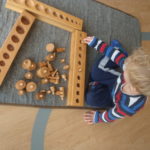
Pedagogical Montessori method allows the children to achieve their potential, develop their skills and learn joyfully and without stress. It teaches the child to respect others and itself, to take care of his surroundings. It teaches to free behavior within shared rules.
The teacher is a guide and equal partner, who help the child on his journey of discovery and learning. Show toward child maximum responsiveness, openness and patience.

Principles:
-
Help me to do it myself
-
The child is the creator himself
-
The hand is the instrument of the spirit
-
Children themselves choose activity
-
Prepared environment
-
Focusing attention
-
Respecting the sensitive period
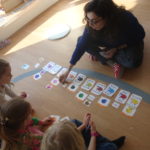
Help me to do it myself
The role of adults is to help the child with his own pace and efforts to gain new knowledge and skills in the world that surrounds him.
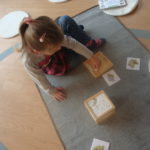
The child is the creator himself
The child grows and develops in contact with the environment, and it is influenced from the people in the surrounding area. And only it itself determines which stimuli, how and when will influence his behavior.
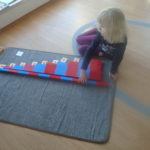
The hand is the instrument of the spirit
The hand is the instrument of the spirit. It is known that the activity of the hand changes over generations. Work with hand leads us to knowledge; it is starting point for understanding things and phenomena, the development of thought and speech. At the beginning child must touch everything. Agility hand is associated with the development of the psyche, became linked with the interconnected physical and mental activity, to acquire new knowledge and understanding. That is why in the early age of 6 is recommended continually development of the fine motor skills.
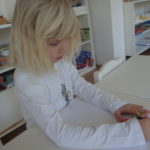
Respecting the sensitive period
Montessori says that the conditions are very favorable in some stage of development, but in the next stage of development may change in ineffective or even adverse.
Sensitive phase of education means that a child is at this stage optimally prepared to acquire certain knowledge or skill. After its fading, the same process can be difficult. For example, up to six years continues the phase of sensitivity for language: the child is able to learn foreign languages with much less effort than in older age. Phase of sensitivity for orders is period which occurs in the age of 2 years and can last up to two years. The child has at this period a lot of interest in the order of things in time and space. It seems to him that everything should be in place, activities take place regularly, it itself announces festive rituals. Insists on
regularity and is angry when something falls outside of the usual order. This tendency can, of course, be used positively.
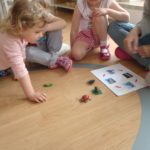
Children themselves chosen activity
The children themselves decide where and with whom they will work, number of repetitions, how long the activities will continue.
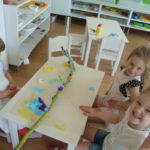
Prepared environment
Childbirth is for parents and educators as a white sheet of paper: it is our responsibility, what on it we will write. Let us realize, in which environment the child enters: how to treat him, how we show him enough respect, with what tone we talk to him? M.Montessori writes: „By the birth of a child, it does not enter into its natural environment, but in an environment significantly reshaped by human activity. It’s a foreign environment, built at the expense of human nature, in human desire for easier and more comfortable way of life „(M. Montessori, “Mysterious childhood”). Prepare the environment does not necessarily mean buying expensive toys and educational aids, it means primarily „make time“. The child often wants to do what we do – so it is best to try to engage him in it. The more we prohibit him participating in our activities, the more conflicts we are facing, unnecessary shouting, anger and tears.
What is generally prepared environment – both at home and in preschool institution?
Prepared environment is the place where the material is arranged in such a way to enable the child to acquire new knowledge as possible without foreign help, that child was led to independence and grew up as a responsible person. The child does not need to be constant repair; it itself comes to where has made a mistake. The pedagogue Karel Rýdl explains:
„Prepared environment must be toward child friendly. Domestic objects in this environment look like miniature versions of those with whom we treat adults in the real world. It could be prepared in such a way so that children can freely move, work and be handled without fear of injury. “
The main idea is to respect the personality of the child, to create for him properly prepared environment with a pleasant atmosphere.
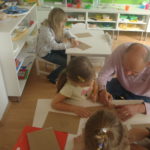
Focusing attention
It is the basis of learning: if a child is working intently with one tool, it is important at such a high concentration of attention not to disturb and allow him to finish the job.
